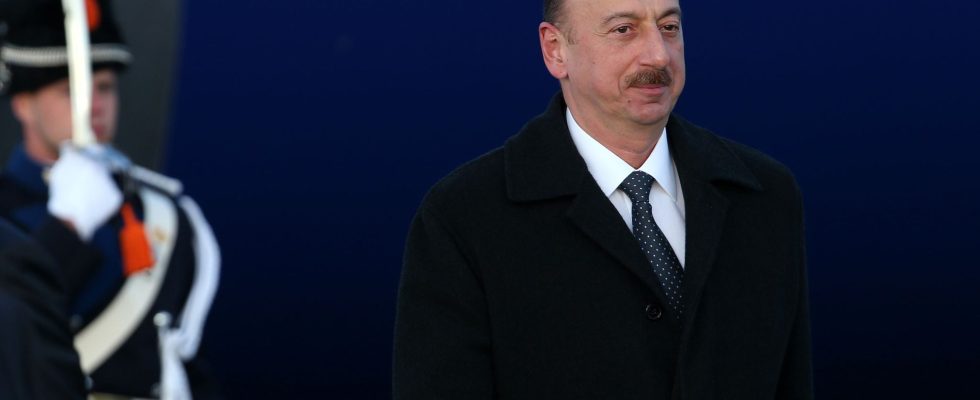“President Ilham Aliev kept his word and fulfilled all his promises,” insists one of the presidential candidates, Fouad Aliev (no relation to the head of state), during the debate organized on January 15 by public television. The declaration of this zealous competitor alone sums up the complete absence of opposition during the presidential election in Azerbaijan, a Caucasian country of 10 million inhabitants, which on Wednesday February 7 will consecrate the Azerbaijani dictator, Ilham Aliev, for a fifth term, or seven additional years. “Of the six candidates running in this election, all have supported the president in the recent past,” writes the OSCE in a reportwhile the real opposition to the Aliyev regime decided to boycott the election” – as it already did in 2018.
To ensure a total electoral victory, the dictator has, for years, done everything to eradicate all forms of opposition in the country, ranked, in 2023, in 151st position in the annual Reporters Without Borders ranking. The weeks leading up to the election were marked by the arrest of eight journalists, five of them being part of the investigative media outlet Abzas Media. Recently, in partnership with the collective of journalists Forbidden Stories, they helped to reveal cases of torture of prisoners in Azerbaijani detention centers.
Nagorno-Karabakh, source of legitimacy for Aliyev
With a score of more than 80% of the votes in each election since coming to power in 2003, Ilham Aliev has carved out, over the years, a tailor-made place at the top of the state apparatus. In 2009, he changed the country’s Constitution to allow him to run for president indefinitely. And, in 2016, the presidential term was extended from five to seven years. At 63, the son of dictator Heydar Aliev – head of the Soviet KGB in Azerbaijan since the 1960s who became president upon the country’s independence in 1991 – is today beginning his 21st year in power. Freed from the shadow of his father, he is driven by only one goal: to avenge the dark years that Azerbaijan went through in the 1990s.
The reign of Heydar Aliyev was painfully marked by the defeat of Azerbaijan against Armenia at the end of the war between the two neighbors between 1991 and 1994. The Armenians then took possession of Nagorno-Karabakh and the surrounding territories. . Since the four-day war in 2016, during which Baku began to regain ground on Yerevan, clashes have continued around the enclave of Nagorno-Karabakh, historically populated by Armenians, and demonstrate the military superiority of Azerbaijan. In 2020, the Forty-four Day War caused the deaths of more than 3,000 Armenians, then, in 2022, nearly 200 square kilometers of territories acquired by Yerevan were violently retaken by the Azerbaijani army. Each of his successes offers the opportunity for Ilham Aliev to parade in military uniform in his country, delighted to have finally chased away these “fascist dogs of Armenians”, as he describes them publicly.
But it is the total conquest of Nagorno-Karabakh, in September 2023, leading to the exodus of 100,000 Armenians towards Armenia, which truly consecrates Ilham Aliev. Celebrated with great fanfare in Azerbaijan, the event was presented as “unprecedented in the history of Azerbaijan” by the president, giving him an unprecedented boost of legitimacy.
“West Azerbaijan”, an established nationalist narrative
But will Ilham Aliev stop there? Nothing is less sure. “If Azerbaijan were to normalize relations with Armenia, it would mean the end of a three-decade-old political strategy that has ordered Azerbaijani society around the axis of conflict,” writes Caucasus specialist Laurence Broers, from the American think tank Chatham House. Unwilling to develop a peace treaty with Armenia, Ilham Aliev is more enthusiastic about stirring up hatred against “Western Azerbaijan”, that is to say Armenia.
A supposedly independent NGO, the West Azerbaijan Community – formerly the Azerbaijan Refugee Society, founded in 1989 – clearly illustrates this ambiguity. Officially, this association (in reality, created by the State) claims the right of return of Azerbaijanis expelled from Armenian territories at the end of the 1980s.
On his website, revised in 2024, we find the map of Armenia and its regions renamed in Azerbaijani. Its president, Aziz Alakbarli, is a deputy of the presidential party and close to Ilham Aliev. On his 61st birthday, the master of Baku declared: “West Azerbaijan is our ancestral land, this is confirmed by numerous documents, maps and our entire history,” in front of the same West Azerbaijan Community. It is impossible to predict how far Ilham Aliev, the incarnation of an exacerbated nationalism, can go.
.
